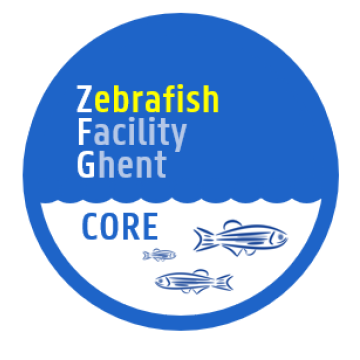Core Zebrafish Facility Ghent

About zebrafish and the facility
The zebrafish (Danio rerio) is an increasingly popular model organism which offers several advantages over other model organisms for disease (including cancer) modeling: low cost, short reproductive cycle, external fertilization and development, production of large numbers of synchronous and rapidly developing embryos per mating and the optical transparency of zebrafish embryos make it an excellent tool for high-throughput disease modeling and drug/toxicity screening. The availability of a wide range of molecular techniques such as large-scale genome mutagenesis, transgenesis and overexpression/knockdown approaches, have also increased the power of zebrafish as a model organism. Finally, due the high genomic and molecular similarities between zebrafish and other vertebrates, many of the important discoveries in zebrafish development are applicable to humans.
The Core Zebrafish Facility Ghent, in its present form, has a capacity of about 17000 adult fish, which are housed in 6 “semi-closed” recirculating systems that provide automatic water circulation, automatic monitoring and displaying of the most important water quality parameters to ensure optimal and standardized environmental conditions for the fish. Besides wild type zebrafish, also several transgenic reporter lines and models for different human disorders, including different cancer models, are maintained in these systems. Important zebrafish lines are archived by sperm cryopreservation in order to prevent unexpected loss. Embryos and early larvae are kept in an incubator under constant temperature and automatic light/dark cycles. We use an easy-accessible software package, available on touchpads, to manage the zebrafish stocks, the breeding programs and daily husbandry tasks. A fully trained animal caretaker is involved in the breeding and care of the fish.
Services and expertise
- The Core provides housing tank positions for rent and our staff can help researchers to manage their zebrafish lines which includes caretaking, breeding and genotyping.
- Researchers can also be trained in basic zebrafish techniques such as microinjection and microscopy (with further access to equipment).
- The Core provides services for the generation of knockout or knockin disease models, mostly made through CRISP/Cas9 editing or by injecting tol2-based plasmids.
- Drug or Toxicity screens can be performed where we usually assess morphology and growth, survival, cardiotoxicity and also behavior
- The Core provides services for sperm cryopreservation of zebrafish strains which also includes long term storage.
- Delivery of embryos or adult fish or dissected organs (brain, liver,…).
- Custom services for more extended and complex projects such as xenografting (PDX or patient-derived xenografts) or in-depth study of disease models (which can include specific stainings, sectioning, EM, expression analysis,…).
Team
- Paul Coucke - Director ZFG
- Hanna De Saffel - Technological expert ZFG
- Andy Willaert - Facility manager ZFG
- Karen Vermeulen - Zebrafish animal care taker ZFG
Contact & links
- Lab address: Core Zebrafish Facility Ghent, Ghent University Hospital, Medical Research Building – MRB1, ingang 34, Corneel Heymanslaan 10, B-9000 Ghent, Belgium
- Website
- CMGG
- Speleman lab
- mail: zfg@Ugent.be
- tel: +32 9 332 4396